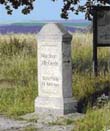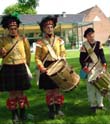| |
| |
EDITORIAL
This very day, a year ago, the president of the Fondation Napoléon, the Director, Irène and myself were in a suburban train in London, returning to France from Greenwich after the inauguration of the triumphant Nelson and Napoleon exhibition at the National Maritime Museum. It was of course hard to believe that at the very time we were sitting on our train, 54 people were dying on the other side of the city as a result of terrorist attacks. We remember the victims and the families who mourn them, but we also remember that our study, history, is one of the pillars of what the ancients called the 'artes humaniores', the 'more humane arts'. It is our duty and responsibility to record and interpret the events of the past, especially where blood has been spilt, in an attempt to understand them. But also in the spirit of all that is good about humanity and its potential for humane behaviour, we can try to ensure that we avoid repeating the brutalities of yesterday. Perhaps by encouraging the world to reflect on the complexity of the past, we can hope to counter the simplicities of all forms of extremism.
Peter Hicks, Irène Delage

|
|
|
| |
NAPOLEONIC ITINERARIES: DISCOVER JENA
Since 2006 is bicentenary year for the battle of Jena, why not visit this remarkable part of Germany. We bring you here an itinerary with three routes created by the Town of Jena. The first route takes you around the battlefield of Jena with its splendid setting in the valley of the river Saale, via the Napoleon stone and the museum in Cospeda. The second route takes you to the site of the battle of Auerstedt, and the third takes you along the Napoleon route with the different parts of the battlefield linked by foot, cycle or car routes. Here you can plant your footsteps in those of the Grande Armée. And going a little further a-field we bring you the jewels of region, including Weimar and Erfurt. Have a nice wander!
Dornberg © Stadtmuseum Jena

|
|
|
| |
THIS MONTH'S ARTICLE
Air and graces: Napoleon and vocal music, by Peter Hicks
Throughout his life Napoleon was a confirmed music lover. Like all his contemporaries, he was a passionate visitor to the opera, seeing 163 different operas and attending 319 performances.(1) As early as the Lyons prize essay (1791), he is recorded singing its praises. “For every age and in every situation,” he enthused, "music consoles, pleases, disturbs delightfully… We should not therefore proscribe music: it is the man of feeling's tender companion, it inspires his emotions. It increases the number of his enjoyments, and as he savours all the minute details of the charming melody, he is more deeply affected by the delights of the emotion...”
The Italian contralto, Giulia Giuditta Grisi (c) Fondation Napoléon

|
|
|
| |
RE-ENACTMENT SEASON
Following on the remarkable bicentennial re-enactment at Austerlitz at the end of last year, the nice weather is returning (as are the summer battle anniversary days) and so there are many Napoleonic re-enactments currently in the pipeline, including events this weekends at Pultusk in Poland, at Waterloo in Belgium, in Boulogne in northern France, and also in Neuf-Brisach in Alsace.

|
|
|
| |
200 YEARS AGO
On 7 July, 1806, general Marmont (1774-1852) was appointed governor general of Dalmatia. His activity in this role was significant. Perhaps most importantly, he enlarged the duchy in 1807 by adding the town of Ragusa, a town which he had taken from the Russians and of which Marmont was made duke in 1808.
On 12 July, 1806, the Treaty of Paris was signed, bringing into being the Confederation of the Rhine(Rheinbund). The treaty was ratified by Napoleon on and the contracting parties on the 19th of the same month.
Find out more about the Confederation of the Rhine by visiting our bicentennial dossier.
On 13 July, 1806, Chateaubriand embarked on a long research visit to the Near East, where he discovered the civilisations and landscapes which were to provide him with the background for his next writings. This of course included Venice, the stepping off point for the orient, followed Constantinople, before retracing his steps to go to Greece which was for Chateaubriand an epiphany. From there he headed for Jérusalem where he was made Knight of the Holy Sepulchre. The account of his journey was to be published five years later under the title, Itinéraire de Paris à Jérusalem (French text downloadable on Gallica).
150 YEARS AGO
On 7 July, 1856, Hippolyte Fortoul, French minister for Instruction publique et des Cultes (that is, for public education and religion), died of an attack of apoplexy in Ems (Germany). When his body was brought back to France it was laid in a chapel of rest set up in the offices of Fortoul's ministry. His funeral, paid for by the state, was held in the church of Saint Thomas d'Aquin, near the Assemblée nationale in Paris on 12 July. Fortoul, an academic by training, had been appointed minister on 3 December, 1851, the day after the coup d'Etat. He was also once briefly French Navy minister.
Wishing you an excellent, Napoleonic, week.
Peter Hicks
Historian and Web editor
THE NAPOLEON.ORG BULLETIN, No 379, 7 - 13 July, 2006
Interested in the work of the Fondation Napoléon? Why not participate, either generally or in a specific project, by making a donation.
© this Napoleon.org weekly bulletin is published by the Fondation Napoléon. Reproduction or all or part of this bulletin is forbidden, without prior agreement of the Fondation Napoléon.

|
|
|
|
|
|
|
|
|
|
FONDATION NAPOLEON LIBRARY
During the summer, from 17 July to 18 August, the Bibliothèque M. Lapeyre-Fondation Napoléon library will have the following opening hours:
Tuesday, Wednesday and Thursday from 1-30 to 6pm. Normal opening times will resume on 21 August.
THIS WEEK in the MAGAZINE
PRESS REVIEW
- The Gazette: the Member's Journal of The Napoleonic Alliance, vol. Winter 2005
- The American west conquered by... mosquitos
WHAT'S ON
Television:
The century that made us - watch clips of the episodes online.
Conferences:
- Wellington 2006: Third International Congress, Southhampton, UK
- Workshop: Luigi Emanuele Corvetto (1756-1821), financier, lawyer and politician, Genoa–Imperia, Italy
Commemorations:
- Pultusk 2006, Pultusk, Poland
- Jena 1806-2006 - Rendezvous in Thuringia The "Journées de Thuringe 2006" and the bicentenary of the Battle of Jena/Auerstädt
Exhibitions:
- 100 years ago: Life in a Swiss château from 1856-1906, Arenenberg, Switzerland
- Louis Bonaparte and the Leiden powder explosion, Rotterdam, Netherlands
- Adel im Wandel (Changing nobility) Exhibition in the Prinzenbau and Landeshaus Sigmaringen, Germany
- Bayerns Krone 1806 (Bavaria's crown, 1806) Exhibition in what used to be the king's residence in Munich, Germany
- Napoleon and Nassau Exhibition in the Wiesbaden Casino-Gesellschaft, Germany
- Das Königreich Württemberg 1806–1918. Monarchie und Moderne (The kingdom of Württemberg 1806–1918. Monarchy and modernity) In the old castle, Stuttgart, Germany
- 200 Jahre Großherzogtum Baden (200 years of the Grand Duchy of Baden) Badisches Landesmuseum Karlsruhe, Germany
- The price of the new crown: Baden and Wurttemberg as Napoleon's vassal – the Confederation of the Rhine 1806 Wehrgeschichtliches Museum Rastatt, Germany
- NAPOLÉON An Intimate Portrait, South Carolina State Museum, Columbia, South Carolina, USA
- Napoleon on the Nile: Soldiers, Artists, and the Rediscovery of Egypt, New York, USA
- Il tempo dell'Imperatore: gli orologi restaurati delle residenze di Napoleoni all'Elba
Got a problem with the letter? Try the home page: http://www.napoleon.org
<<
|
|



